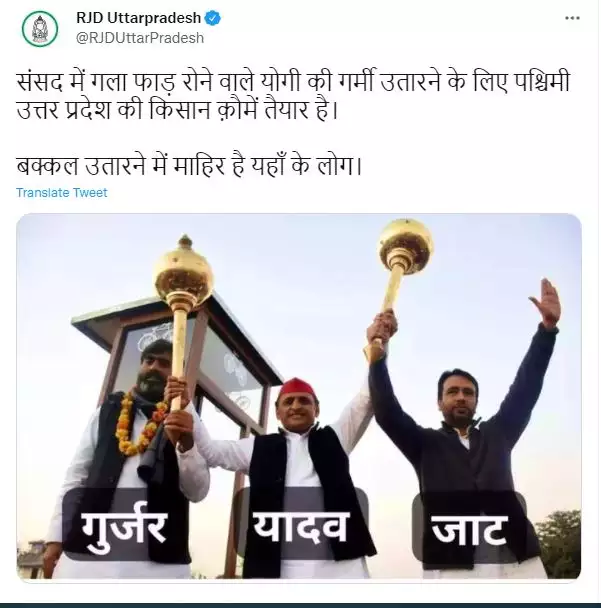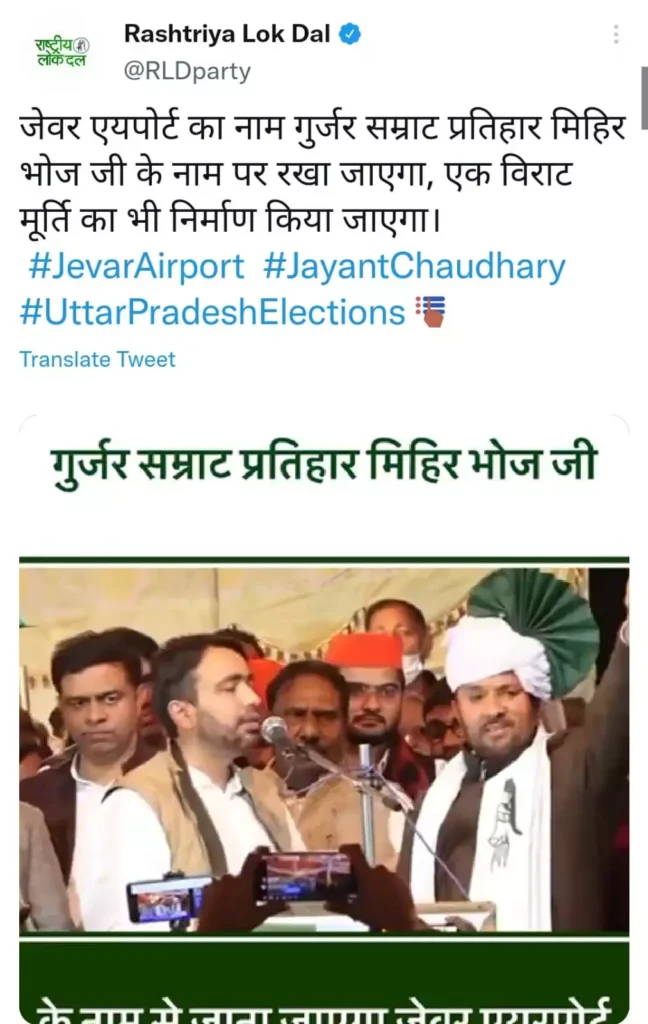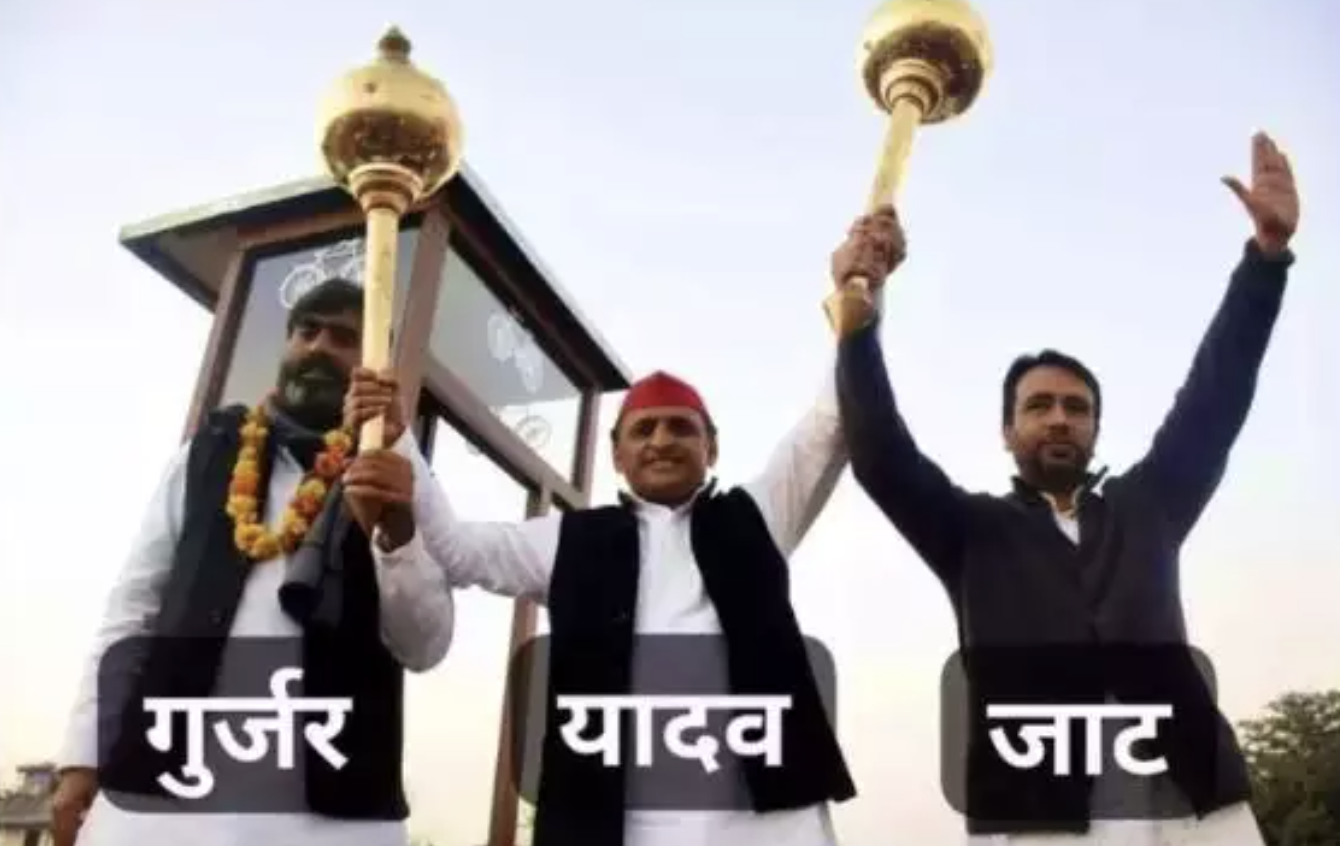Doublespeak Criminal politics of non-Kshatriya Feudal castes
The Karpuri Thakur Model of OBC reservation predicted and warned against hijacking of the OBC movement by (non-kshatriya) Feudal castes. Unfortunately a major blunder on part of former Prime Minister VP Singh was to ignore Karpuri Thakur’s argument and blindly adhere to BP Mandal’s recommendations (Karpuri Thakur was a true leader of the “real” OBCs, while BP Mandal was an Ahir zamindar). Consequently, the 1990s witnessed political rise of of some non-kshatriya feudal castes led by criminal minds whose lack of ethics and conscience is reflected in their doublespeak and penchant for propaganda.
These dabang caste-led parties claim historical and contemporary oppression at hands of Yogi and Kshatriyas while simultaneously seeking to appropriate Kshatriya identity.

For instance, two years ago, noted Ahir journalist and intellectual Dilip Mandal attacked Ravindra Jadeja’s Rajput identity by invoking Prithviraj Chauhan’s defeat at Second Battle of Tarain. However, almost a month later Mandal declared Prithviraj as Gujjar.
Similarly, some years ago Vishwendra Singh, the erstwhile Bharatpur Jat royal and BJP minister, asserted in an interview that the Jats were Shudras while making the case for OBC reservation for Jats of Bharatpur and Dholpur (two former Jat princely states). The Jats of Rajasthan were not categorised as OBC in the 1990s due to their strong representation and zamindaris. However, in the 2000s, Jat intellectuals published several articles and papers claiming that Jats were Shudras, and equated the Jat experience with that of African-Americans in the west and Dalits in India. Fearing caste mobilisation and lured by vote-bank politics, the Vajpayee government granted Rajasthan’s Jats reservation.

However, contradicting their own narratives while seeking reservation benefits, Jat elites, organisations and leaders also assert a distinct Kshatriya lineage. For instance, Vishwendra Bharatpur’s family often boasts of their Yaduvanshi Kshatriya lineage, claiming descent from a Rajput prince and his Jat concubine. In a similar vein, the Chabuk Jat zamindars of Pisawa near Aligarh boast of a fabricated Tomar lineage (Tomar is a Rajput or Kshatriya clan)(H R Neville, District Gazetteers of Agra & Oudh, p. 100). Evidently, narratives shift from being Shudras oppressed by Kshatriyas to actually being Kshstriyas based upon convenience (source: History of Mewat by Dr, Aijaz Ahmad, Pg 174).
This politics of doublespeak has been pursued by many other politically powerful and resourceful caste lobbies lately. On August 21st 2012, Gujar organisations, led by Col. Kirori Bainsla and Himmat Gujjar, issued a memorandum to the Rajasthan Government stating that 99% of Gujjars are nomadic forest-dwellers. Today, Mr. Himmat Gujar – alongside the Akhil Bhartiya Veer Gurjar Mahasabha (ABVGM) – is now militantly asserting that all pre-Mughal Rajput rulers and Rajput clans – notably the Chauhans, Pratihars, Parmars, Chandels, Bhatis, Chavdas, and Tomars – were/are Goojars. But the truth of the Gujars is between these two extreme narratives. They are neither landless nomads unlike the Vangujars nor do they have real connection with Rajput clans. Gujars became landed farmers and some of them even gained zamindaris in late Mughal era, after which they began fabricating genealogical connections to their Rajput/Kshatriya benefactors.
However, the most remarkable example of this doublespeak politics is the Samajwadi Party, which has its roots in the ideology of Ahir zamindar, Rao Bahadur Balbir Singh of Rewari, and the All India Ahir Kshatriya Mahasabha of 1920. Ahir politicians and intellectuals are known to dabble into both Bahujan politics as well as claim a Kshatriya identity, shifting narratives frequently. For instance, on one hand Akhilesh Yadav and Prof Mandal claim that Ahirs are oppressed Shudras when addressing the Dalit-Bahujan audience, while at other instances, they proudly claim that Ahirs are Yaduvanshi Kshatriyas – notwithstanding that the early mediaeval Yaduvanshis of Braj are an entirely different people.
The anti-Kshatriya rhetoric around the UP elections also exposes the obsessive pursuit of a Kshatriya lineage and a Kshatriya history by Jats, Gujars, and Ahirs despite their nominal allegiance to Bahujan politics for political power.
While bureaucrats, royals and aristocrats from OBC castes (eg Kurmi royal RPN Singh who joined BJP) have been projected as Rajputs/Kshatriyas by the opposition for convenient rhetoric, on the other hand they play politics over identities of bygone Rajput chiefs (Mihirbhoj Pratihar or Prithviraj Chauhan) despite open letters from the living descendants and clansmen of these monarchs. On one hand, the rhetoric of Thakurvad is used to incite retributive violence against lower class and middle class Kshatriyas, on the other hand prominent Rajput kings of bygone era are promoted as Jats or Gujars.
Many years back when noted political psychologist Ashis Nandy remarked about corruption in OBC politics, it raised many eyebrows in Phuleite circles. However, he was not far from the truth. The doublespeak pursued by zamindar castes within the OBC category (also called upper OBCs), their caste demagoguery, inconsistent propaganda, media manipulation and intimidation politics (that includes both violence and blackmail) has remained an open book. However, it is not just ignored but appeased by the Hindutvadis and the liberal-left. Even Ambedkarites never question their doublespeak narratives, although the dominant castes account for most anti-Dalit atrocities instead of the cliched Brahmin, Bania & Kshatriya. The Phulekar OBC intellectuals never challenge their contradictions, despite their baleful hegemony over the OBC politics and its socioeconomic benefits.
- Recently while addressing the Global Jat Summit under the protection of soldiers, Satyapal Malik, the Meghalaya governor boasted about his caste-men killing Indira Gandhi and General Vaidya. He was cheered by the educated and upper-class crowd of his caste. However, those intellectuals and narrative builders who felt offended at Ravindra Jadeja calling himself Rajputboy gave this a casual pass.
Rightwing intelligentsia cancels the diverse Muslim community, while the Leftwing intelligentsia vehemently cancels the Brahmin and the Kshatriya communities. But both of them uncritically support violent contradictions of the dominant castes’ leadership.
Supported by both the Right and the Left, it will be interesting to see how much the dominant castes can grab in the UP elections. Can they grab the Kshatriya heritage while also retaining their OBC privileges?
https://timesofindia.indiatimes.com/blogs/voices/up-elections-doublespeak-of-the-dominant-castes/

